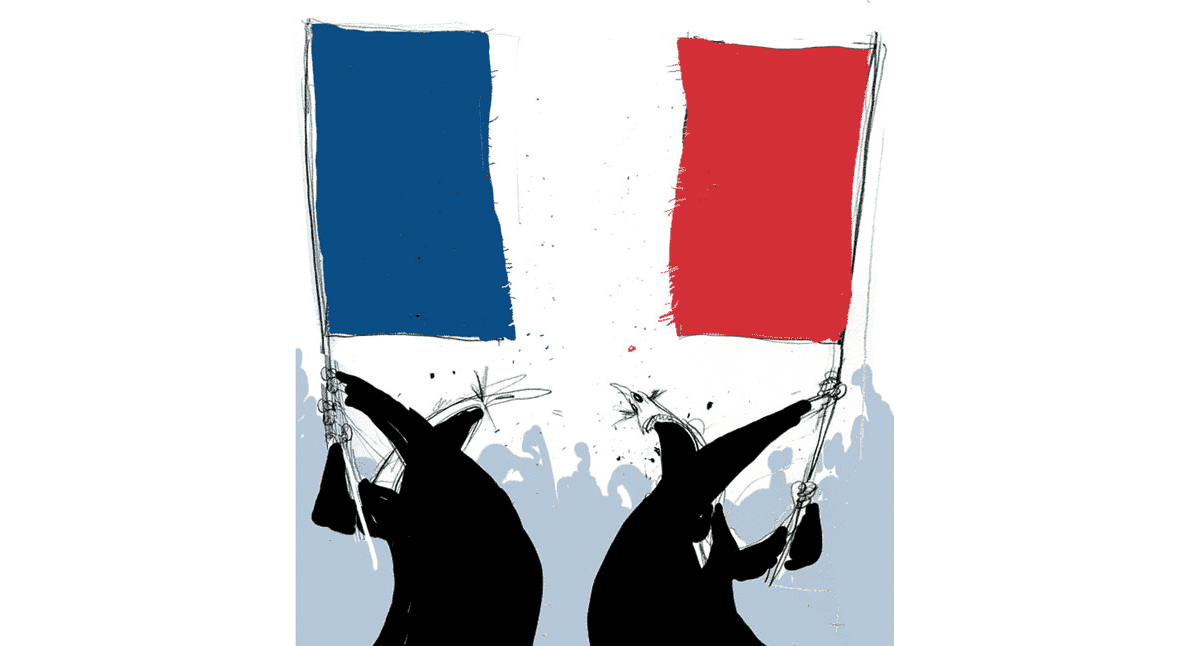A lot happened in France last night. After a lacklustre performance, long disillusioned supporters were unable to summon any enthusiasm for Paris Saint Germain football team’s French league championship success. Emmanuel Macron was re-elected French President beating Marine Le Pen 58.5 to 41.5 per cent and the official disco party celebration organised beneath the Eiffel Tower finished early. A short distance away on the Pont Neuf police shot and killed two men who drove a car at them. Demonstrators took to the streets and threw fireworks in protest against Macron’s election in Paris, Lyon, Strasbourg, Rennes, Grenoble and a host of other French towns where teargas scuffles took place.
Emmanuel Macron made the shortest victory speech of his career. A far cry from the pomp and grandiloquence of 2017. He all but apologised for so many voters having cast a ballot to block his rival rather than for him. He promised to do better. Yet the great impresario of historical symbolism then set off in his motorcade for La Lanterne, the Chateau de Versailles’ former royal hunting lodge, now a grace and favour residence, to celebrate with his family. A prominent Mélenchon party leader was aghast at the symbolism.
At the heart of all this is a France divided into three blocs
Abstentionism was the highest since 1969 and combined with blank and spoilt ballots accounts for 35 per cent of the electorate. The radical left Jean-Luc Mélenchon, with his 22 per cent in the first round and in favour of a 6th Republic, described Macron’s victory as swimming in a sea of abstentionism. According to Le Monde, Macron’s true score is 38.5 per cent of registered voters. Macron beat Le Pen by 18.8 million votes to 13.3 – the nationalist right’s highest ever score – but compared to 2017 Macron’s votes dropped by two million, Le Pen’s increased by 2.7 million. Macron is correct that many of his voters – 42 per cent in fact – did not cast their vote for him but merely to block Le Pen. To compensate he vowed to give the French people a larger, as yet unspecified, say in their future by greater direct democracy and referendums.
The predominant portion of Macron’s vote was the 65 plus demographic with a smaller contribution from the 18-24-year-olds. The majority of Marine Le Pen’s voters were in the 25 to 65 range. Sociologically, France at rest versus France at work. The electoral geography of either candidate’s vote conforms to largely unchanged patterns of right and left since the 19th century. But with Macron successful in the traditional right-wing strongholds of the centre and Catholic west; Le Pen in left-wing bastions of the rust-belt north and northeast and the south-east. The one big difference is that Macron’s vote came from France’s large towns and cities, while Le Pen’s was garnered from rural areas, notably urban peripheries that gave France the gilets jaunes and the left-behinds of la France periphérique.
So what is the state of France before the next hurdle: the 12 and 19 June legislative elections? France’s prime minister Jean Castex will tender his resignation by early May when election campaigning restarts. France will barely have a minute before it is plunged again into introspection, political and social fragmentation – not to mention possible governmental instability resulting from a fractured National Assembly. Seat selection horse-trading has been underway since before the second round. There will be blood on the carpet yet.
At the heart of all this is a France divided into three blocs (four if abstentions are included): an amorphous and fluctuating status quo centre around Macron; an as yet disunited radical right from Le Pen to Zemmour; a disunited radical left in favour of regime change around Mélenchon.
It was another time and a different election. France’s President on reaching the end of his mandate had not been prepared to stand aside, and the resulting coup d’etat had enthroned him as Emperor Napoleon III. His aim was to industrialise and modernize France. He was at heart a liberal head of state. Elections continued; indeed referendums or plebiscites became an added feature of political life. But this was to ignore the underlying tensions at the heart of French society. ‘France has 36 million subjects, not including the subjects of discontent,’ observed a polemicist. The legislatives of 24 May and 7 June 1869 sparked riots. Bonapartist candidates in favour of empire garnered 59 per cent versus 41 per cent for the two other groupings: royalists who wished for a restoration and republicans who clamoured for a republic.
France’s division into three blocs continued to undermine society. To be fair it was not an authoritarian regime. But it was unloved by the French people. So when its hubristic head of state decided on war with Prussia a year later and got himself captured, it was not long before the republic was declared and the emperor exiled to England.







Comments